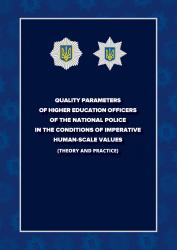Psychological and pedagogical content of the implementation of international standards of ethical behavior in the training of police officers in Ukraine
Keywords:
communicative competence, National Police of Ukraine, human rights and freedoms, ethical principles, interaction, personnel policy, convention, rules (codes) of ethical behavior, psychological contact, reform, humanity, police deontology, leader, law enforcement system, courage, police ethics, leadership, law enforcement agencies, honesty, corruption, self-organization, law and order, responsibility, child protection, self-development, professional identity, justice, minor, narrative professional ethics, legal and psychological foundations official activities, respect, traumatic events events, trust, professional activity, moral behavior, stress, police, service training, legal basis of professional ethics, child-friendly room, National Police of Ukraine, professional training of a police officer, ethical principles, psychological safety g compliance, personnel policy, professional selection, rules (codes) of ethical behavior, resilience, reform, training of police officers, police deontology, psychological resources, law enforcement system, professionalization of law enforcement officers, police ethics, education, law enforcement agencies, personality of a police officer, corruption, EU educational policy, law and order, value experience, child protection, education applicant, professional identity, competence, minor, transformational learning, legal and psychological foundations official activities, communicative competence, traumatic events events, forms and methods of education, professional activity, interaction, stress, education quality, service training, psychological contact, child-friendly room, assessment, professional training of a police officer, leader, psychological safety g compliance, police performance assessment, professional selection, leadership, resilience, departmental assessment, training of police officers, self-organization, psychological resources, assessment procedure, professionalization of law enforcement officers, self-development, education, work program of the academic discipline, personality of a police officer, narrative professional ethics, EU educational policy, assessment methods, value experience, moral behavior, education applicant, criterion analysis, competence, legal basis of professional ethics, transformational learning, assessment criteria, forms and methods of education, learning outcomes, education quality, behavioral diagnostics, assessment, workshop, police performance assessment, psychological training, departmental assessment, psycho-pedagogical support, assessment procedure, pedagogical skills, work program of the academic discipline, pedagogical skills of a higher school teacher, assessment methods, advanced training of scientific and pedagogical personnel, criterion analysis, assessment criteria, learning outcomes, behavioral diagnostics, workshop, psychological training, psycho-pedagogical support, pedagogical skills, pedagogical skills of a higher school teacher, advanced training of scientific and pedagogical personnelAbstract
Chapter 8 specifies the psychological and pedagogical content of the implementation of international standards of ethical behavior in the training of police officers in Ukraine on the basis of the methodological principles of the humanistic approach, interactive learning technologies and modern didactic principles, which should be the basis of the professional training of police officers in their practical orientation while modeling the real process of official activity within the walls of HEI, with the inclusion of teachers in this process as subjects who have the techniques of organizing their own professional activities and analyze the ways of professional self-development. Methodical and practical psychological and pedagogical directions for the implementation of the ideas of humanistic pedagogy are presented, as well as the development of methodological foundations for the implementation of international standards of ethical behavior in the training of police officers in Ukraine on the basis of a general scientific holistic approach, which is an objective need of the modern national education system in general and the training of police officers in particular. It has been proven that Ukrainian society needs a comprehensive strategic and balanced educational policy for the training of specialists who should be characterized by appropriate professional and personal moral and managerial qualities, because the main duty of a police officer is to serve people, to respect the constitutional rights of freedom, equality and justice. It is substantiated that in such a context, the issue of concretizing the axiological and nation-building content and developing the methodology for preparing and evaluating relevant programs, training of scientific and pedagogical personnel acquire special significance.

QUALITY PARAMETERS OF HIGHER EDUCATION OFFICERS OF THE NATIONAL POLICE IN THE CONDITIONS OF IMPERATIVE HUMAN-SCALE VALUES
Downloads
Pages
Published
Categories
License

This work is licensed under a Creative Commons Attribution-NonCommercial-NoDerivatives 4.0 International License.

